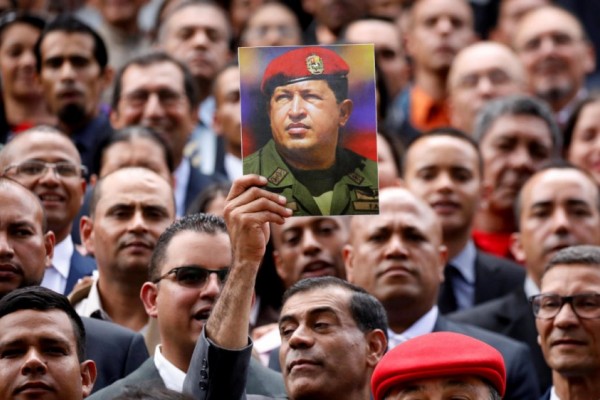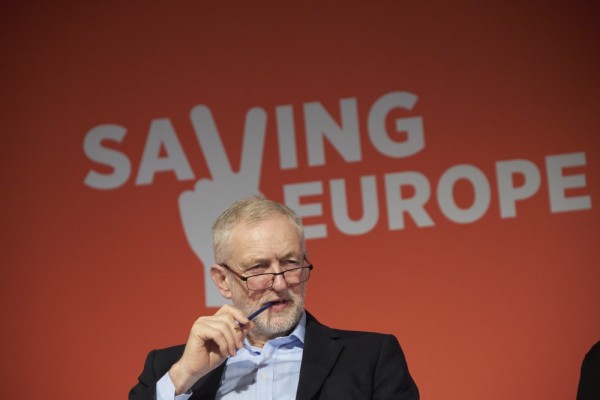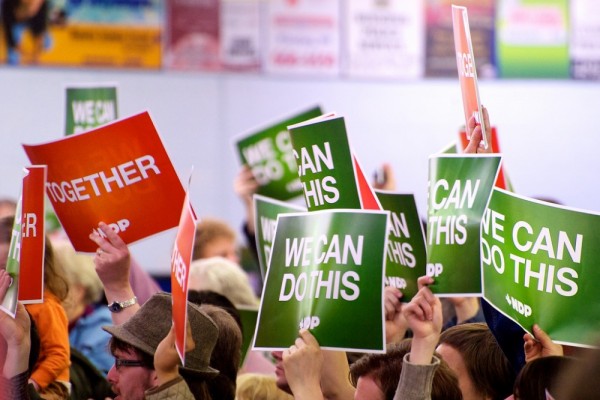El Salvador: A New Chapter Begins

During the 12 years of civil war, the Farabundo Marti Front for National Liberation (FMLN) managed to build and maintain the unity of five allied politico-military parties and various civil-political parties and movements of the Democratic Revolutionary Front (FDR). This formation was a cauldron of ideas – as much those disputed as those agreed – of actions by all united and specific to the different elements. The FMLN-FDR caught the attention of the entire world. It challenged the government of the United States in massive demonstrations in the front yard of its own capital building. It convinced the state of Mexico and the social democratic forces of Europe to oppose the strategy of Ronald Reagan in Central America and support a negotiated solution. In November of 1989 it managed to carry its offensive “Febe Elizabeth Lives” to the limit and oblige the right of the death squads truly to negotiate and dismantle its structures of repression. Popular unity was seen in the streets. The strength of the resistance was felt. A mystique of solidarity was alive. But the social transformation proposed by the same revolutionary movement was postponed, waiting on a new victory of the same party, the FMLN, transformed into a legal party and dedicated to win power by the electoral road not the military. Shortly after the signing of the peace accords in 1992, the “Broad Front” started to deteriorate. Two of the five founding parties of the FMLN were left outside the Political Commission of the new re-founded party and pulled out to launch their own party – an initiative which came to nothing more than the dispersion of its social base. Various purges of the membership of the new FMLN followed – eliminating those not loyal to a leadership more and more concentrated and monopolized by two elements of the historic party – the Communist Party and the Popular Front for Liberation – the second a son of the first, and both characterized by their verticalism (top-down structure and culture). Little by little, the party substituted itself for the social and labour movements from which it was born and prioritized locating its team in the positions associated with its new quota of power – in the municipalities and the Legislative Assembly.
The “Closed Front” The process of enclosing itself accelerated in 2009 when the new FMLN won the presidency and with that the opportunities to reward its most loyal elements and family members with stable and well-paid jobs. It is true that the Front had to offend its own principles to affiliate the candidate Mauricio Funes at the last moment – Funes, a journalist without a history of militance in the party. But no one complained given that the result was to attract other sectors to the project of “Change” and win the executive power. Not until years later was it understood that that this first president of the republic from the left exposed a vulnerable flank of the party – to be accused of being corrupt like all the others. No one questions the honor of the second president of the republic for the FMLN, Salvador Sanchez Ceren, but unfortunately there are various officials of his administration that have left us doubting that their first duty is to the people. And these were enough for the accusation to stick – for disappointment to flourish. But the factor of “the corrupt” could not explain such a decisive defeat. The FMLN’s candidate in the recent election was left with only 14.4 percent of the vote – far from the result in the presidential elections of 2014 and only half of its vote in the legislative elections of 2015. ARENA and is allies were left with 31.7 per cent – close to its historical record. And so, how to understand that the denouncing of the corrupt did not affect ARENA so much? – with its long and recognized history of mega corruption – including a convicted ex-president. Its that, in the case of ARENA, there was no deception – its base did not expect anything different – its history is known and tolerated.
The Base Which Hoped for More In the case of the FMLN, its base, yes, hoped for more. The FMLN came to the executive power carrying all the aspirations of the revolutionary masses which gave strength to the historic movement, and the administrations of Funes and Sanchez Ceren accepted the charge of accomplishing a good part of that agenda. But, in fact, it was only part, and what yes was accomplished, was sometimes only half done. Veterans who waited for their meagre pensions until just days before the election. The producers of shoes and uniforms for students who waited for payment until the following semester. The sick who confronted long line-ups and shortage of medicines in the hospitals. The thousands of unemployed. The parents who watched their children emigrate. The old who hoped for a decent pension. Clearly the economic conditions did not permit much more. And the lack of a reliable majority in the Legislative Assembly imposed significant limits on the ambitions of the government. It could be said that all this is not the fault of the FMLN – that the neo-liberal hegemony does not permit more that alleviating the desperation of the working class – that the executive power is limited when its own party does not have more strength in the Legislative Assembly. But the excuses did not matter. The FMLN left the people with their illusions – they even fed them by repeating the beloved revolutionary speeches. And so in the end, the people were disappointed and resentful. This is the material which flamed up with the spark of “corrupt like all the rest” and brought the party to loosing the greater part of its historic base.
The New Option – on the Left or the Right The new option which turned out to be the winner in the first round of the recently held presidential elections came out of that same FMLN. Nayib Bukele was the mayor of San Salvador, elected under the leftist flag. He was expelled from the party at the end of 2017 superficially because he offended one of his own counsel members, but after distancing himself from the leadership on various questions. Bukele allied with the GANA party to be nominated as a candidate for the presidency, after the attempt to register his own party – New Ideas – within the time limits failed – and after other parties available for the purpose were blocked by the Supreme Electoral Tribunal. GANA is a break-away from ARENA which emerged from a coalition of parties on the right which participated in the presidential elections of 2014 under the “UNITY” banner and supported by the then ex-president for ARENA, today imprisoned for corruption, Antonio Saca. On the basis of this history, the candidate Bukele and his party were painted as a new expression of the right by various left-wing columnists. In fact, the New Ideas party of the president-elect has not defined itself ideologically. It is a party in process of formation with a mixed leadership of various tendencies – the disappointed from all the other parties. Its main line has been to put the finish to corruption and demand “the return of what was robbed” – a line with no echo from the main right-wing party – ARENA – nor even much from the associate party – GANA. And so New Ideas is not just more of the same. It is not right-wing. It does not defend impunity. And furthermore, its vote comes in good measure from the left – those who abandoned the FMLN – and only supplemented by GANA. In the legislative elections of 2018, GANA came out with 243,268 votes. If all these voters supported Bukele, they do not represent even one-fifth part of his voter base – 1,434,856. The major part of the base of Bukele voted for the option of the left in 2014.
In 2014, Sanchez Ceren won the presidency in the second round with 1,495,815. In the legislative elections of 2015 the Front came close to their result in 2012, with 847,289 votes and 31 deputies. In the Legislative elections of March 2018, a few months after having expelled Bukele, the FMLN lost almost half of its vote from 2015 and remained with only 437,760 votes and 22 deputies. In the presidential elections of this year 2019, the option on the left did not recover anything. The cold reality is that the Front lost even more votes – another 48,471. More than a million voters who elected a left-wing government in 2014, did not vote for the FMLN in 2019. Given that the party on the right, ARENA, did not loose anything either, it is reasonable to suppose that these 1,106,526 votes for the left in 2014 went to Bukele in 2019. The victory of Bukele is truly the defeat of the FMLN.
The Parties Look to 2021 Two years remain before the new correlation of political forces expresses itself in the Legislative Assembly. In the year 2021, the bi-centenary of the Republic of El Salvador, new legislative elections will be celebrated, presumably with the participation of New Ideas, the party of Bukele. In the meantime, the new government will have to deal with an Assembly dominated by the right and also construct its party, its structure and its socio-political orientation. The first test of its character will be the question of water – to privatize it or to leave it in the hands of the state. Everything that happens in this Assembly will be elaborated with all eyes on the next Assembly. It is difficult to imagine that the coalition of GANA with New Ideas will survive, but again, much depends on their positions on the question of water. If GANA goes with ARENA, it becomes more difficult to avoid the proposal from the right – to manage the system with a council dominated by private business.
In all of this, the role of social and labor movements will be decisive. New Ideas requires a strong fraction in the next Assembly to guarantee its future. The new party cannot disappoint it base from the left, not in the battle against corruption, nor in the defense of social gains, nor in defense of water as a common good of the people. The ARENA party is already into an internal fight for a new leadership. Callejas, their ex-candidate, stays quiet. The other pretenders for that nomination are positioning to take advantage of the opening. Various deputies for ARENA are supporting a proposal from Bukele – to redirect a loan from a new building for the Assembly toward the construction of 50 model schools. But the party maintained its base – it survived the Bukele phenomenon. And so, with its dominant position in the Assembly, the internal fight will not lead to greater trouble. The ARENA party does not have to rebuild itself. The case of the FMLN is otherwise. No one is going to propose a change of program, of ideology, of commitment to the working class. But yes, there will be a purging of the leadership and a renewal of the historic commitments. There are already voices being heard which propose that the defeat and the times require something more. The Political Commision has declared that its current members are not eligible for nomination in the next internal election. And so, there will be a real contest. Oscar Ortiz, vice-president with Sanchez Ceren, and Hugo Martinez, ex-candidate, have proposed to run for General Secretary – and there are others who want to run. The project of recovering its strength in the Legislative Assembly and the Municipalities in 2021 is no easy task. The Bukele phenomenon continues to dominate the political panorama.
The FMLN cannot wait for its base to return disappointed by New Ideas. A transformation is required not only of its structure but also of its culture – building a true internal democracy without verticalism – transparent elections at all levels – a voter/membership register open to all who profess loyalty to the principles of the party and pay the quota. And further, it is time to rebuild the alliances with currents and movements – which facilitate a broad and fluid unity – in solidarity with struggles which emerge in the various sectors and on various issues. The challenge for the FMLN is to demonstrate that it is capable of transforming itself and recuperating, in some way, the mystique of it first chapter. Again, the first test will be the question of water. To defend water, the legislative caucus of the FMLN has no option other than to look for allies amongst the other parties in the Legislative Assembly, including the parties on the right, and with the new President. But in the end it will be the strength of the popular movement of resistance to privatization which determines the result.
Donald Lee has worked in solidarity with the union movement in El Salvador since the 1980’s. He can be reached at [email protected].
This article originally appeared in Donald Lee’s SALSOL Observer, which has been distributed privately for 10 years, in English and in Spanish.










